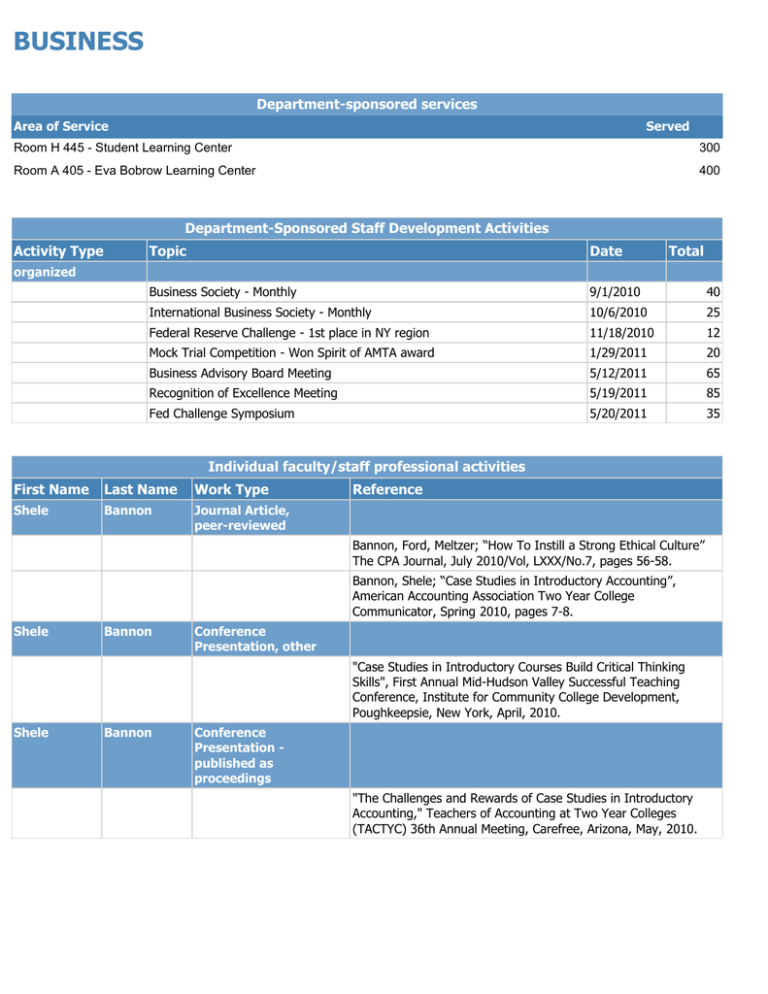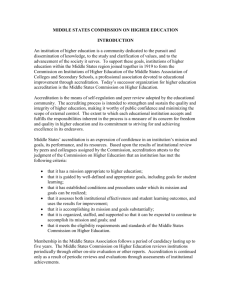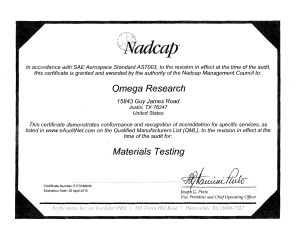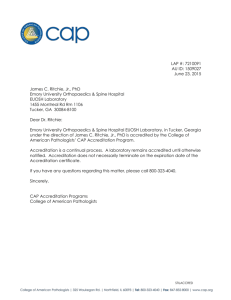BUSINESS
advertisement

BUSINESS Department-sponsored services Area of Service Served Room H 445 - Student Learning Center 300 Room A 405 - Eva Bobrow Learning Center 400 Department-Sponsored Staff Development Activities Activity Type Topic Date Total Business Society - Monthly 9/1/2010 40 International Business Society - Monthly 10/6/2010 25 Federal Reserve Challenge - 1st place in NY region 11/18/2010 12 Mock Trial Competition - Won Spirit of AMTA award 1/29/2011 20 Business Advisory Board Meeting 5/12/2011 65 Recognition of Excellence Meeting 5/19/2011 85 Fed Challenge Symposium 5/20/2011 35 organized Individual faculty/staff professional activities First Name Last Name Work Type Shele Bannon Journal Article, peer-reviewed Reference Bannon, Ford, Meltzer; “How To Instill a Strong Ethical Culture” The CPA Journal, July 2010/Vol, LXXX/No.7, pages 56-58. Bannon, Shele; “Case Studies in Introductory Accounting”, American Accounting Association Two Year College Communicator, Spring 2010, pages 7-8. Shele Bannon Conference Presentation, other "Case Studies in Introductory Courses Build Critical Thinking Skills", First Annual Mid-Hudson Valley Successful Teaching Conference, Institute for Community College Development, Poughkeepsie, New York, April, 2010. Shele Bannon Conference Presentation published as proceedings "The Challenges and Rewards of Case Studies in Introductory Accounting," Teachers of Accounting at Two Year Colleges (TACTYC) 36th Annual Meeting, Carefree, Arizona, May, 2010. Individual faculty/staff professional activities First Name Last Name Work Type Shele Bannon Service to department, College, University, community, and/or professional society Reference Chairman and Coordinator for Queensborough's 50th Anniversary Business Academy event, "Students Voice Their Values on Ethics". New York State Comptroller, Thomas DiNapoli was keynote speaker combined with presentations by student winners of the Business Academy Ethics Dilemma Essay Contest. Coordinator for winning Business Academy Team for "Walk To Aspire" for 2010 - most funds raised through student fund raisers. Co Faculty Leader for Business Academy and Cohort. Kelly Ford Journal Article, peer-reviewed Shele Bannon, Kelly Ford, Linda Meltzer; "How to Instill a Strong Ethical Culture: Economic Downturns Present an Opportunity," The CPA Journal, July 2010. Wendy Ford Book, Authored Ford, W. G. (2010). An Examination of the Utilization of Electronic Government Services by Minority Small Businesses. Ann Arbor, MI, USA: ProQuest LLC. Linda Meltzer Book, Edited Financial Institutions and Markets by Peter Rose, published by McGraw Hill. Dynamic Business Law, by Nancy Kubasek, McGraw Hill, 2010. Linda Meltzer Journal Article, peer-reviewed "How to Instill A Strong Ethical Culture," CPA Journal, July 2010. Linda Meltzer Service to department, College, University, community, and/or professional society Faculty Advisor for Fed Challenge team that competed for Regional Competition. Sebastian Murolo Conference Presentation, other “Debunking Some Common ‘Myths’ About Estate Planning,” Sponsored by the Personal Financial Planning Committee of the Nassau County Chapter of the New York State Society of Certified Public Accountants, Hofstra University Club. “Planning for Personal Residences,” Sponsored by the Real Estate and Personal Financial Planning Committee of the Nassau County Chapter of the New York State Society of Certified Public Accountants, Hofstra University Club. “IRA Distribution Planning” Sponsored by the Medical and Other Professionals, Employee Benefits and Personal Financial Planning Committees of the Nassau County Chapter of the New York State Society of Certified Public Accountants, Hofstra University Club. Sebastian Murolo Other S. B. Murolo, “Tax Update,” The Chevron – N.Y.P.D. Retired Sergeants Association newsletter, April 2010. Individual faculty/staff professional activities First Name Last Name Work Type Reference S. B. Murolo, “Roth IRA’s Compared to Traditional IRA’s,” The Chevron – N.Y.P.D. Retired Sergeants Association newsletter, June 2010. S. B. Murolo, “What Is Going On With the Economy?” The Chevron – N.Y.P.D. Retired Sergeants Association newsletter, December 2010. Phyllis Pace Book, Authored Pace, Phillis M. 2010. Word 2010 Basics. H. M. Rowe, 2010. Phyllis Pace Service to department, College, University, community, and/or professional society Academic Senate--Department Representative Committee on Committees--Member Business Department--Curriculum Development Christina Tucker Manzo Conference Presentation, other "Cheating the Cheaters - Academic Integrity in the 21st Century," Teachers of Accounting at Two-Year Colleges (TACTYC) annual conference, Arizona, May 2010. Edward Volchok Newspaper/Magazine Article QCC's WIDWAC newsletter. "WID/WACKY by Edward Volchok Last December I finally completed WIDWAC training. Since joining the faculty in 2006, I repeatedly told my chair I would get certified. Yet I found myriad ways of dodging what I anticipated to be a boring and vexing chore. Writing Intensive (WI) training had become my bête noire. I looked forward to it with the same disdain I once held for my Junior High School grammar classes. Racked with guilt, I had become WIDWACKY as I invested WI training with my worst fears about writing. Sometimes it pays to confront your fears. Upon starting WI training, I quickly discovered it was not like my hated adolescent experience in Mrs. F’s English classes. John Talbird’s WI sessions were, dare I say, fun. Our group discussed the importance of getting students to write well and ways to overcome the tedium of grading stacks of their incoherent papers. While I have made written assignments a core part of my classes at the college, I was growing increasingly frustrated by students’ inability to craft a simple declarative sentence, or even to offer me the courtesy of proofreading and spell-checking their papers. I had often surmised that I was devoting more time correcting a few students’ papers than they had spent writing them. I was delighted to learn my colleagues had similar feelings. And, I was thrilled to learn strategies to get students to dirty their own hands and re-writing assignments. As a result of my WI sessions and the time I spent with my fellow, Vienna Messina, I heavily edit only one or two paragraphs, and then turn my attention to the content of their papers. Based on my editorial comments, I direct students to restructure their papers. I understand students’ fears of writing. I was not a strong writer when I started college, and yet I was not required to take an English composition class. But I learned to write well in college by writing, even if many of my essays were far from brilliant. I still hear shrill Mrs. F telling me that my spelling and grammar are atrocious. After getting my PhD in political theory, I looked at the bleak prospects for a position as an assistant professor and started a career in advertising at Foote, Cone and Belding. My boss ripped my first memo apart. “Too hard to read,” she shouted. “Make it easy to scan quickly or go back to the Ivory Tower.” Stung by her critique, I quickly learned the craft of writing short, persuasive memos. Instead of turning to Aristotle’s Rhetoric as my dissertation advisor would most likely have suggested, I found a little booklet written by Ken Roman, the CEO of Ogilvy & Mather, an ad agency that would eventually hire me. When thinking about a WI assignment for my students, I remembered this experience. And I assigned writing business memos to my three honors students in my Statistics class. My honors students’ memos enlightened me. They were getting top grades on examinations that stressed solving problems in context. But their memos were both innumerate and illiterate. They struggled to determine what kind of analyses to use and often had difficulty with simple calculations. And their memos were confused and rambling. No executive would invest the time to determine what my students were attempting to convey. I had anticipated having students rewrite these memos once. Sadly, they typically required four or five drafts to develop an acceptable memo. The intensity of WI was driving my honors students a little WIDWACKY. My most promising Statistics student, a young man with only three years experience with English, complained that writing good English was too hard when he broke the honors contract. A second student quit the day after his acceptance letter from Baruch College arrived. But, my third student did complete the program. And, she, like many of our students, is not a native English speaker. With inspiring determination, she continually faced the tyranny of the blank page. Our victory is that she can now craft a cogent memo, a valuable skill for anyone planning a business career. Now I ask you, is there a better remedy for WIDWACKY than that? *** Edward Volchok Conference Presentation, other Developing presentation on Queensborough Community College’s efforts to develop a quality eLearning program for the 7th Annual CUNY General Education Conference at York College on 5/13/11. Working Title: “Preparing Students for eLearning: The Queensborough Community College Student eLearning Readiness Program.” Presentation will be delivered by Edward Volchok and Denis Bejar of the Queensborough. Presentation to the 9th Annual Future of the Faculty Conference at Bucks County Community College on 6/3/11. Increasing Student Retention in eLearning Classes" Curricular Changes - Program Course Change Program Semester Comments Certificate Program in Accounting/OAT Fall 2010 Approved by Academic Senate in spring 2010 Initiated Modified Dual/Joint Degree Program in Forensic Accounting To be voted on by Academic Senate with modifications made by John Jay College Personnel or organizational structure changes, newly developed projects Changes Dr. Brenda Hersh - retired Mr. David Ledo - retired Professor Leslie Francis - hired Professor Stephen Hammel - hired Professor Anthony Kolios - resigned from Business Department P&B Professor Glenn Burdi - elected to Business Department P&B Professor Edward Hanssen - elected to Business Department P&B Facilities/space changes Facility modification Purpose Podia installed in rooms H308, H339, H340, Improved classroom A308, A 312, A 312 instruction Semester Facility Evaluation Fall 2010 Equipment installed and operational Equipment changes Equipment Changes Purpose Semester Evaluation Smart podiums installed in rooms H339, H340, H344, A312, and A313 Update and improved classroom instruction Fall 2010 Faculty report that the utilization of this equipment has improved and updated their instruction Resource changes Other Resources Purpose Semester Astoria Savings Bank $5,000 Grant to support the Federal Reserve Challenge Spring 2011 Funding used to support student participation in Fed Challenge Flushing Savings Bank $2,500 Grant to support the Federal Reserve Challenge Resource Evaluation Funding used to support student participation in the Fed Challenge Other changes affecting department NA Departmental procedures for conducting assessment The Business Department is accredited by the Accreditation Council for Business Schools and Programs. The Department was accredited in 1997 and again in 2007. Currently, the Business Department is accredited through the year 2017. In 2009 a biennial Quality Assurance Report was submitted to the ACBSP and the 2011 QA Report is being prepared for submission. A key component of the accreditation process is the assessment of curricula and courses therein. The Department has developed a protocol that places it on a three-year assessment cycle. These assessments have bee uploaded to the College Assessment web site. Assessment results are also shared with faculty within specific disciplines and subject areas and with all faculty through area meetings and at general Department meetings, thereby allowing us to "close the loop' with regard to assessment. Discussions by the Department Chairperson and members of the Middle States Team resulted in the Department being praised for its program of "continuous improvement." The Business Department is accredited by the Accreditation Council for Business Schools and Programs. The Department was received its initial accreditation in 1997 and has been accredited since. The most recent affirmation of accreditation was awarded in 2007 and runs through 2017. A major component of the accreditation process is assessment of curricula and courses therein. The Department has developed an assessment protocol that has placed it on a 3-year cycle. Our assessments have been uploaded to the College Assessment Website. Results of the assessment are shared with faculty in specific subject areas and with all faculty through area meetings and at general department meetings, thereby allowing us to "close the loop" with regards to assessment. Discussions by the Department Chairman and members of the Middle States team resulted in the Department being praised for its program of "continuous improvements." Departmental participation in self-study/program review Program(s): Reviewed All degree programs were reaccredited in 2007 External Agency: Accreditation Council for Collegiate Business Schools and Programs Date: 02/01/2007 Conclusions of Self Study: Business Department was accredited through the year 2017 Conclusions of External Reviewers: Department was asked to submit biennial Quality Assurance report; 2009 report was submitted and approved and 2011 report is being prepared for submission Action Plan: Continue assessment of curricula and courses Program Review Follow-up Action Item Timeline Accomplishements Data to be collected by the Office of Institutional Research Biennial Quality Assurance Reports Data continues to be collected along with to be submitted. Reaffirmation of course assessments Accreditation to be conducted in 2017 Course Objectives and Course Assessment Course Assessed: 301,305/306,307/308,701,50,509,521,522,524,532,534,801,859,903,906,907,908,909 Educational Objectives: 1. Communicate effectively through reading,writing,and speaking, 2. Use analytical reasoning, 3. Reason quantitatively and mathematically, 4. Integrate knowledge and skills into their program of study (a comprehensive list of all QCC objectives is contained in the Business Department Reaffirmation of Accreditation Report that is on file in the Office of Academic Affairs Curricular Objectives: Curricular objectives for each course assessed is contained in each assessment. Results: Results and findings will be discussed among area faculty and at Department meetings. Relevant changes will be introduced as needed. Results will also be uploaded to the QCC Assessment Web Site. Action Plan: Assessment will continue to be conducted on a 3-year cycle. Results and action taken will be reported to Accreditation Council of Business Schools and Programs biennially and as part of Reaffirmation of Accreditation to take place in 2017 Results of certification exams, employer and alumni surveys, student surveys, advisory board recommendations Data Source Results Action Plan 1.Introduce changes in media and business communication into business courses. 2. Continue to emphasize ethical behavior in business. Continue advisory board activity by having experts in the fields of study address faculty and students on relevant issues and topics. In May 2011, Tim Minton of Buzz60.com, and formerly of NBC News, discussed ethics, communication, and the transmission of information via the internet. Advisory Board recommendations Goals/objectives for year just completed Goals Strategic Plan Evaluation of achievement Action Plan 1. 18 courses assessed, 2. Business Department team won the New York Federal Reserve Challenge, 3. Business Department Team participated in the Mock trial tournament and won the Spirit of AMTA Award, 4. Faculty have begun to utilize podia in classrooms, 5. Advisory Board Meeting held to discuss new modes of communication and ethics, 6. CBS News reporter, Harry Smith, discussed his views of student success and recognized our students for their outstanding performance in the Fed Challenge and the Mock Trial competitions Continue activities that enhance and promote our program to students and faculty and enhance their success True 1. Continue course assessment, 2. Federal Reserve Challenge Participation,3. Mock Trial Participation, 4. Podia installed in classrooms, 5. Advisory Board Meeting, 6. Recognition of Excellence Meeting, Goals/objectives for coming year Upcoming Goals Related Strategic Plan Objective Planned Method of Evaluation Finalize the implementation of the Introduce and expand course offerings To be added to the program and course Joint/Dual degree (AS/BS)in evaluation protocol that is used to generate Forensic Accounting with John Jay feedback and corrective action intended to College, 2. Replace faculty who improve departmental offerings. have retired or resigned, 3. Continue to participate in Fed Challenge, Mock Trial, and other student-related activities, 4. Utilize advisory board to receive feedback regarding new and relevant areas for inclusion in courses, 4. Utilize the results of assessment to modify course content





